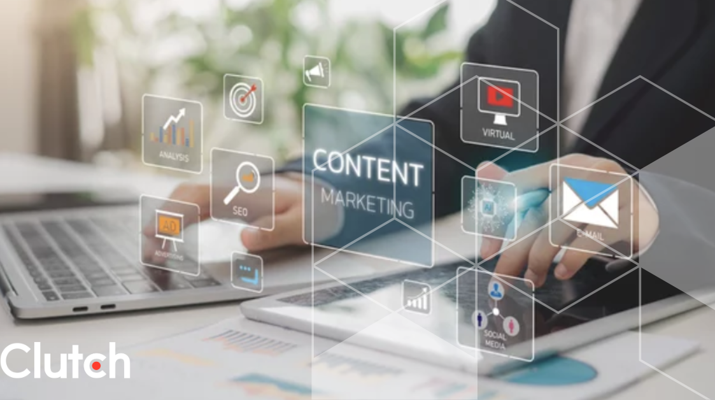

Updated February 5, 2026
Survey finds that how companies immediately react to public relations crises impacts their brand reputation in the long term.
A PR crisis typically qualifies as any situation that escalates rapidly, attracts public or media attention, and has the potential to cause lasting damage. These incidents often unfold in real time and are amplified by digital channels. Common examples include social media backlash, product failures or recalls, executive or employee scandals, data breaches, and sustained negative press coverage.
United Airlines experienced one of the biggest public relations (PR) blunders of 2017. The video footage of an airline official removing an unwilling passenger from a flight affected consumers, 53% of which said in a survey they would discontinue purchasing flights from United Airlines as a result.
Looking for a Digital Marketing agency?
Compare our list of top Digital Marketing companies near you
Was the brand able to recover? Recent news reports say yes, but what did people think when the first news of these controversy broke?
To find out, we surveyed 500 more consumers in 2017 to shed light on how people view United Airlines, Pepsi, and Uber seven months after their public fallouts.
Is it possible that time can heal all wounds? Or, do certain events, and their ensuing message, cause permanent damage to a brand?
Before we get into consumer thoughts, let’s break down what goes into PR crisis management for brands. PR crisis management is the discipline of preparing for, responding to, and recovering from events that threaten an organization’s reputation, credibility, or public trust.
The scope of PR crisis management spans both immediate response and long-term reputation repair. Effective crisis response begins with speed, as delays can allow misinformation and public anger to spread. Organizations should quickly assess the facts, acknowledge the situation, and communicate clearly with affected audiences.
Transparency is critical, including explaining what is known, what is being investigated, and what actions are being taken. Messages should be consistent across channels, emphatic in tone, and align with legal guidance. The goal is to contain damage by restoring trust, reducing speculation, and demonstrating accountability.
Strong preventive measures reduce both the likelihood and severity of crises. These include ongoing reputation montioring, formal crisis response plans, trained spokespersons, and social media preparedness. Clear roles and responsibilities should be defined in advance, typically involving the PR or communications team, legal counsel, senior executives, and operational leaders.
External crisis communications experts may be hired when the issue is highly complex, legally sensitive, or attracting intense media attention. Together, preparation and the right mix of internal and external expertise enable brands to respond decisively under pressure.
Having a solid PR strategy may be the most reliable solution to repairing public image in both the short and long term.
With the passage of time, brands that suffer PR crises can recover as long as they have a long-standing and loyal customer base.
In our 2017 survey, we asked 500 consumers to indicate their willingness to purchase products or services from companies before, immediately after, and seven months after United Airlines, Pepsi, and Uber underwent a severe PR crisis.
United Airlines’ PR crisis made consumers feel unsafe: 30% said that even today they would no longer buy United flights.
In April 2017, United Airlines’ brand image was damaged after the release of video footage that depicted an airline official forcibly removing a passenger from a United flight.
To measure the direct impact United’s PR crisis had on consumers, we asked survey respondents to indicate their willingness to purchase flights from United Airlines before the PR event, immediately after, and seven months later.
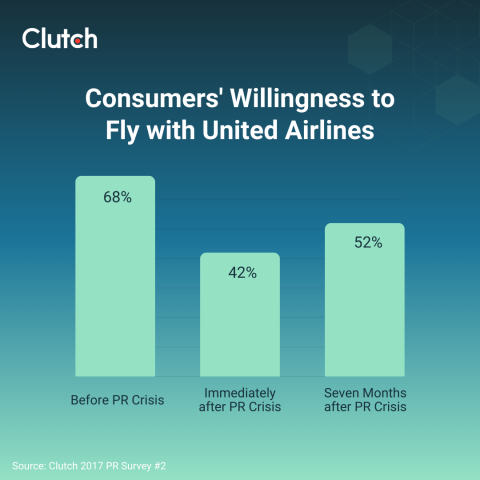
Nearly 70% of consumers indicated they were willing to purchase flights from United Airlines before its PR crisis. This number drops to 42% of consumers who said they were still willing to buy flights from the brand immediately after witnessing the news event.
When asked to give a reason for their change in behavior, 30% of consumers said they lost a sense of safety and trust in United Airlines immediately after its PR crisis and decided not to invest in the brand.
According to Deborah Weinstein, President of Strategic Objectives, an award-winning public relations company in Canada, it’s not surprising that consumers decided not to fly with United Airlines since United’s PR blunder directly relates to consumers' health and safety.
“With United Airlines, their PR crisis was a matter of public safety, which made the situation a lot more serious. Clearly, their brand reputation and sales suffered as a result.”
— Deborah Weinstein, Strategic Objectives
Events that threaten consumers’ physical safety can cause people to lose trust in a company immediately.
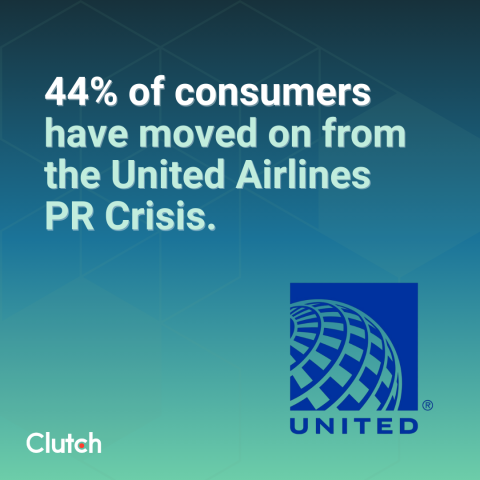
Today, seven months after United Airlines’ PR crisis, consumers’ perceptions of United recovered slightly, with 52% saying they are willing to buy flights from United Airlines. Of these consumers, 44% say that although they reacted negatively to United’s news coverage at first, they have since moved on.
Jeremy Pepper, public relations and communications consultant at Communimatic, a public relations company in Los Angeles, attributes the rise of the internet and social media as one reason why consumers rebound from negative stories they hear in the news.
“Now, more than ever, the internet has accelerated the time that people get over PR crises. It’s like a flash reaction, where people can get upset over one crisis but then quickly move onto the next.”
— Jeremy Pepper, Communimatic
News stories travel rapidly, allowing PR crises to solicit immediate reactions and be usurped by other stories that might be worse.
More than anything, consumers care about their own wants and needs and will purchase products or services that satisfy those wants and needs, according to Weinstein.
"If there are only United Airlines flights available, and there’s no other way to get to your destination, you’re still going to fly with United and hope for the best," says Weinstein. "Consumers are only looking to satisfy their needs – not the needs of the brand."
Though time doesn’t necessarily heal all wounds, it allows for consumers to move past their immediate negative reactions, focusing instead on price, limited options, and accessibility of flights regardless of the airline.
When asked in 2017, consumers had not changed their behavior since Pepsi’s PR crisis due to Pepsi’s consumer following and the product Pepsi sells.
Around the same time as United’s PR crisis, Pepsi underwent a PR blunder by issuing an insensitive commercial featuring Kendall Jenner. The marketing mistake sparked disapproval from consumers who disagreed with the commercial’s message.
Replicating the process with United Airlines, we asked consumers to indicate their willingness to purchase Pepsi products before, immediately after, and seven months after the commercial aired.
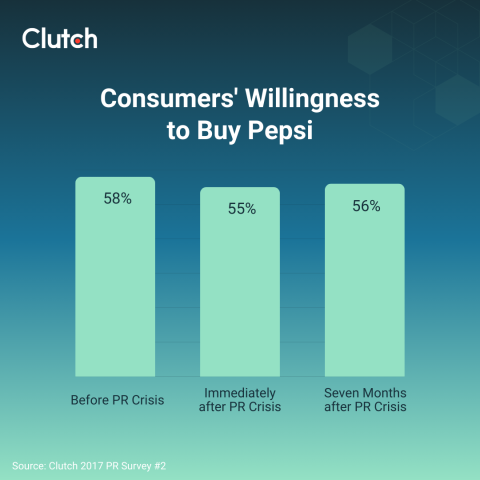
As time passed, consumers did not significantly change their behavior, with respondents’ willingness to purchase Pepsi only dropping from 56% to 55% immediately after Pepsi’s PR crisis.
According to Kent Stones, CEO at Stones Insight, an insights company in Redondo Beach, California, the reason for the minimal change is because Pepsi, being a lifestyle product, has a minimal financial effect on consumers.
“Pepsi is a lifestyle brand. Because of this, consumers are rarely in situations where Pepsi’s products are so dramatically shaping or impacting their lives that any PR crisis will have a significant impact on their lifestyle and identity.”
— Kent Stones, Stones Insight
In the long run, Pepsi’s products don’t have a significant impact on consumers as they go about their day-to-day lives.
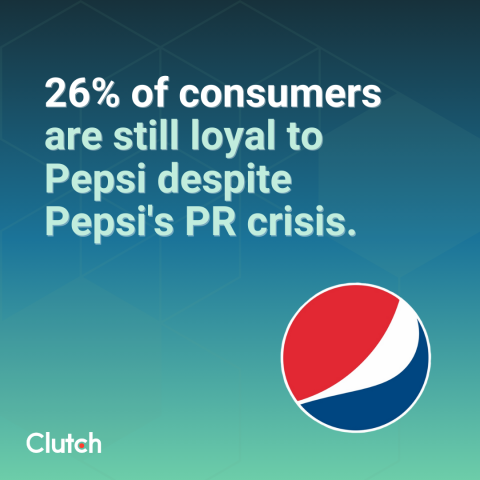
Of the 56% of survey respondents who said that they would be willing to buy Pepsi today, 26% said that they have simply always bought Pepsi and the news coverage didn’t bother them. The other 30% said that though the commercial bothered them at first, they have since moved on.
Tim Collins, Principal at California-based public relations firm Grisdale Advisors and former Senior Vice President of Experiential Marketing at Wells Fargo, says the ability for brands to recover from PR crises depends on their pre-existing brand reputation.
“Unlike Uber or United, Pepsi has a brand reputation that they can draw from. People give them more slack. They made a mistake, but then consumers moved on.”
— Tim Collins, Grisdale Advisors
Pepsi didn’t experience a dramatic change in its consumer following because its customers are loyal, which allows Pepsi to move on from the PR crisis with ease.
Uber faced the greatest threat to its brand reputation in the long term because it lacked a solid consumer following.
Throughout 2017, Uber’s brand experienced multiple PR crises: The ousting of the CEO, allegations of corporate fraud, and multiple cases of sexual assault of both passengers and Uber employees.
We asked consumers to indicate their willingness to ride with Uber before, immediately after, and seven months after Uber was featured negatively in the news.
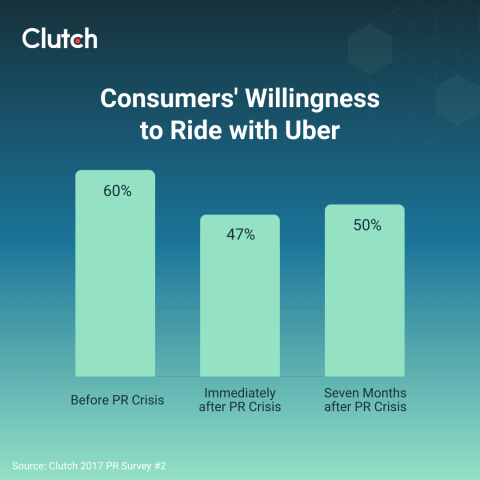
Consumers’ willingness to ride with Uber dropped from 60% to 47% immediately Uber was in the news for multiple misdemeanors.
When asked to explain why their attitude toward Uber changed, 15% of consumers said they lost a sense of safety and trust in Uber and no longer want to invest in its services.
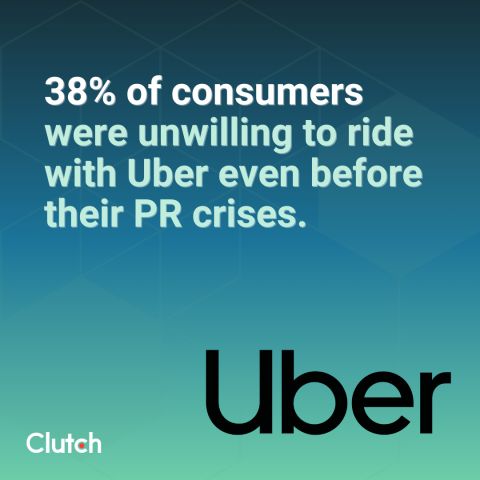
The majority of consumers (38%), however, said that they were unwilling to ride with Uber even before allegations were uncovered in the news.
This trend indicates a lack of consumer loyalty to Uber.
Uber is a relatively young company that has not built a broad consumer base. Uber’s services are still limited to specific regions of the country and though many people are familiar with the brand, they might not have access to Uber depending on where they live or their financial status.
“Uber is a young company. They simply have not had time to establish a strong foundation of basic trust, at either a functional or emotional level. Uber will continue to struggle in light of their PR crises because they don’t have a big trust ‘bank account’ upon which they can pull.”
— Kent Stones, Stones Insight
Because Uber already lacks a strong consumer following, Uber’s many misdemeanors will have a larger impact on their reputation as a company.
What companies do immediately after negative press coverage indicates their ability to manage their brand reputation in the long term.
To define the difference between a short-term and long-term PR strategy, we looked to the experts to weigh in.
“Short-term PR strategies deal with the here and now. Brands must ask themselves, ‘What are some of the issues that we’re facing in the next couple of months? How do we deal with them?”
— Tim Collins, Grisdale Advisors
The most effective way for companies to salvage their consumer following after a PR crisis is to have a PR team in place to act immediately.
Pepsi maintained its consumer base because it addressed its marketing mistake promptly, pulling the commercial and apologizing.
In contrast, United Airlines waited several weeks to apologize, which consumers considered insincere and contrite.
Uber faced the biggest threat to its brand reputation in the aftermath of its PR crisis because of multiple instances of misbehavior and the lack of a short-term PR strategy.
Long-term PR strategies deal with a brand’s overall reputation management. Long-term strategies aren’t likely to change and should align with a brand's values and identity.
According to Collins, a company can rely on a long-term PR strategy to recover from a short-term crisis. He says, “Your long-term PR strategy hopefully builds the brand reputation that you can take to the bank when your company has a shorter-term PR issue.”
In the end, brand reputation is the most important element of a company’s ability to maintain a strong and steady market presence.
Often times, consumers will say one thing but do another. It’s up to companies to keep track of what people say and what they actually do to maintain the strength of their brand.
Each of the companies we studied in our 2017 survey had PR crises tied to social causes. When it’s clear that social norms are in place, people will respond in the way they think is socially acceptable.
"The way United Airlines was positioned in the media following their PR crisis created a negative social bias against the brand," according to Collins. "Because of this, people will react negatively when asked about United because they think they need to. But, they may then go buy a ticket from United 15 minutes later."
In response to the PR crises that companies undergo, it’s easy for people to say they will no longer purchase that company’s products or services. However, these same individuals may still buy from the brand.
Pepper brings up price as the reason people act opposite to their intentions.
“We can all post about not using United again, but actions speak louder. People may actually have a real intention to no longer buy their flights, but at the end of the day, we all act according to our wallet.”
— Jeremy Pepper, Communimatic
Consumers certainly can react negatively to news events, but if prices are low and options are limited, those consumers will likely purchase a brand’s products or services anyway.
Our 2017 survey also found that for each brand – United, Pepsi, and Uber – a large portion of the respondent pool had never purchased from those companies but were still familiar with their PR crises.
In fact, of consumers who were familiar with Uber’s negative press coverage, 65% had never used Uber before.
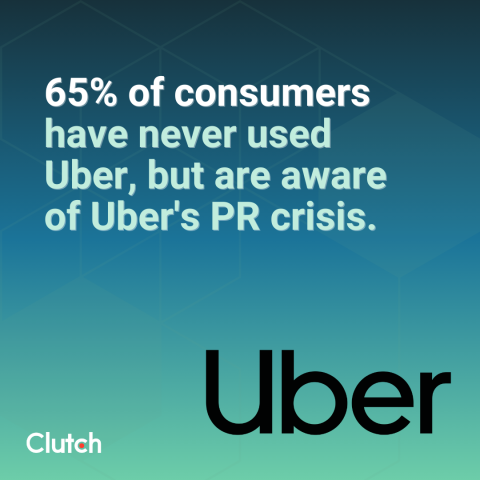
Deborah Weinstein emphasizes that even if consumers aren’t purchasing from a brand, the company should pay attention to that audience.
"Even people who have never used Uber may still have been considering giving it a try," says Weinstein. "But if all they’re hearing and seeing about Uber is negative, their potential for acceptance will decline."
Consumers' perceptions of brands can impact their decision to purchase products or services down the line.
Brand reputation is the most important element of any company’s ability to maintain a solid consumer base, especially in the aftermath of a PR crisis. Whether you’re a startup or a large corporation, having a solid public relations team on your side is imperative.
Public relations strategies impact the long-term strength of brands.
To make sure your company has the support it needs, check out our listing of Top PR Firms to find the best provider for your business.
In 2017, Clutch surveyed 500 consumers above the age of 18 and located in the United States. For each brand in the study, the screening criteria included only consumers who were familiar with the PR crises mentioned.


